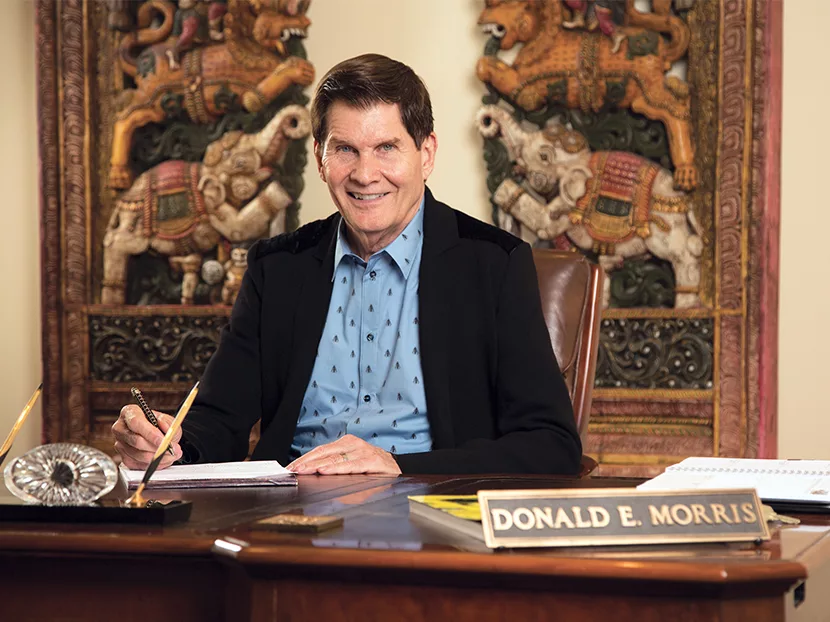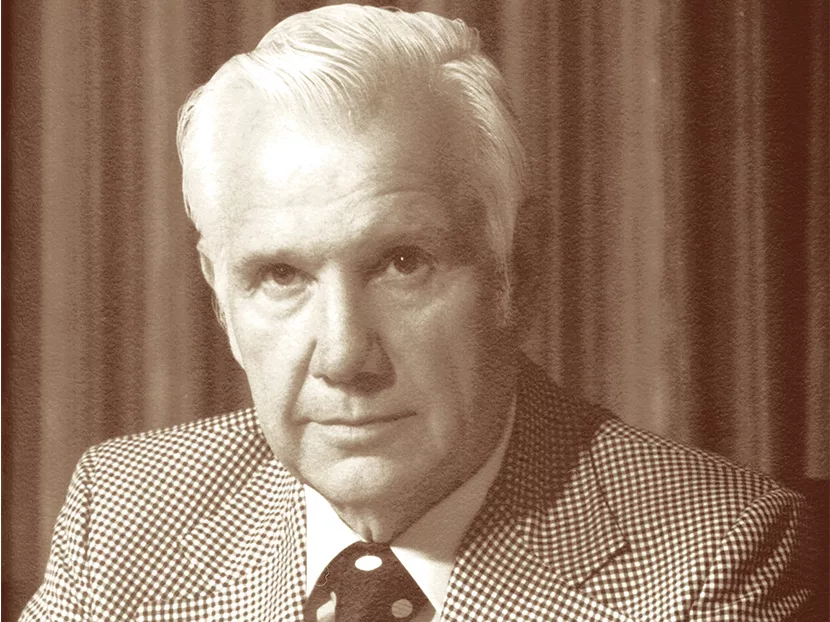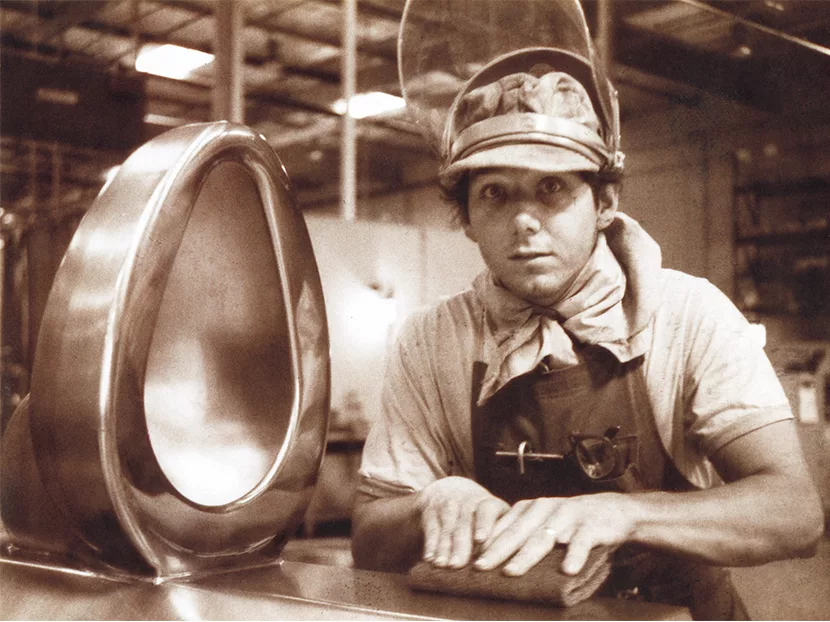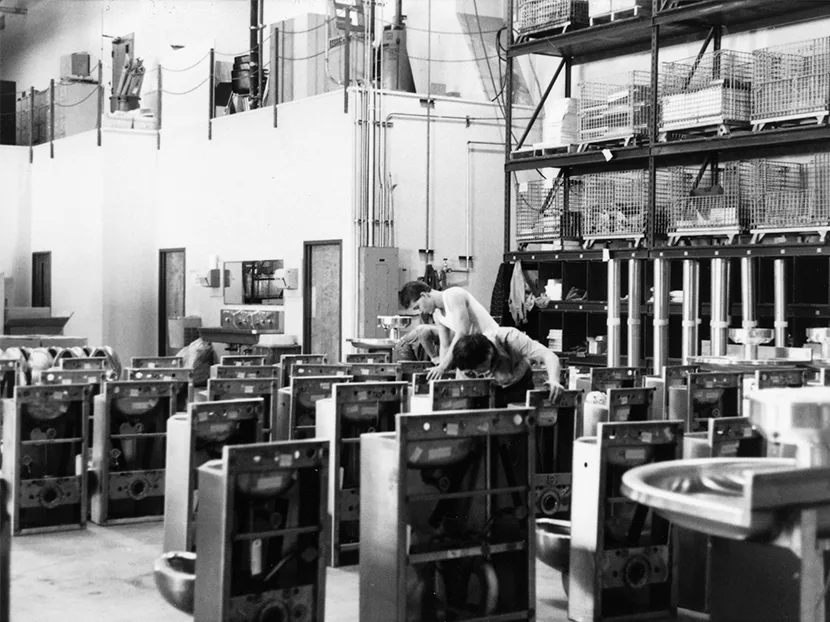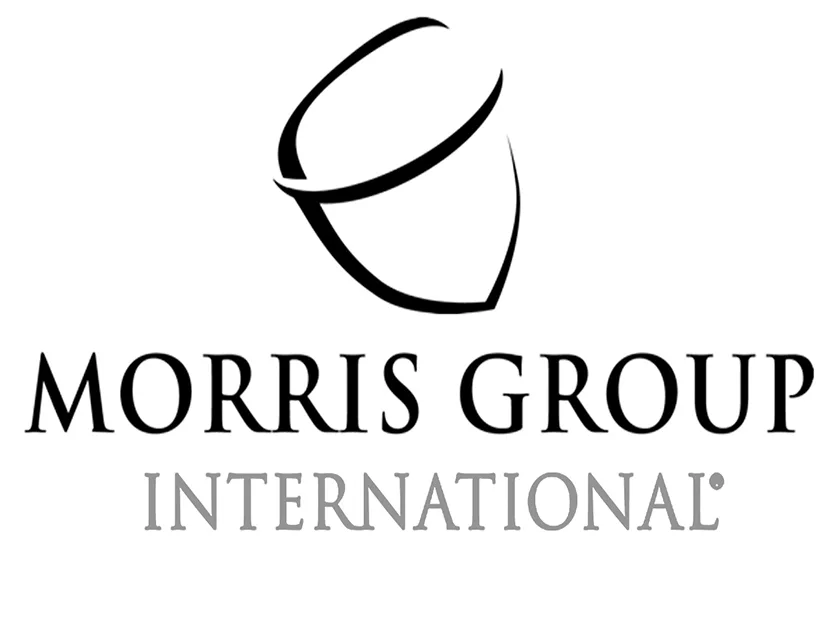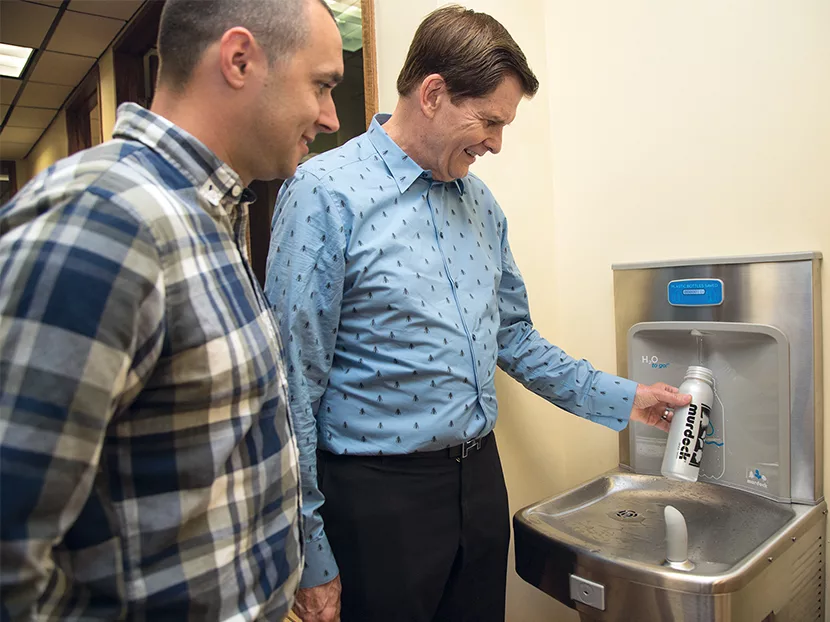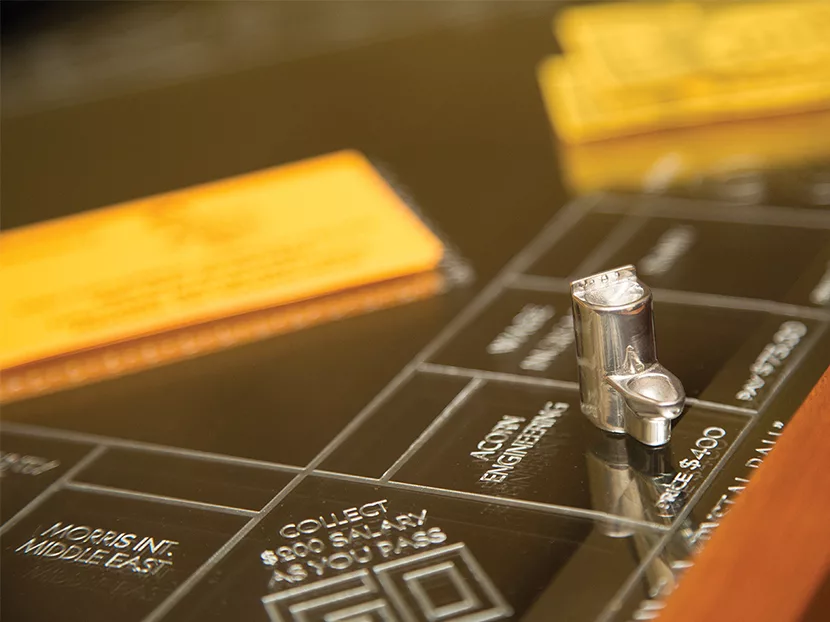How do you measure success? Some might consider wealth or status as a sign of accomplishment, while others put more weight into stature or eloquence. Since success is subjective, there really isn’t a right or wrong answer. But as we searched for the 2017 Person of the Year for The Wholesaler magazine, we looked for an individual who exemplified some very straightforward traits — accountability, character, courage, commitment, graciousness, ability to inspire, loyalty, respectability, and most of all, approachability.
When we put our heads together, there was one person who rose to the occasion — Donald E. Morris, president and CEO of Morris Group International®.
In 2013, in an article published in our sister publication, PHC News, Don Morris said, “What I look for in people is integrity, honesty and hard work. Those are the same things my dad looked for.” As it turns out, those are the same things he has brought to the table in his 57 years in the industry.
Ask anyone in the plumbing, heating, cooling and piping community, and they will tell you that Don Morris is an icon. He is known among architects and engineers, building owners, contractors, wholesalers, distributors and sales reps alike. He is well regarded and respected. He is the 2017 Person of the Year.
Setting the foundation
Don Morris’ father, Earl L. Morris, founded the Earl L. Morris Company in 1945 and later, in 1954, he founded Acorn Engineering Company®. The name “Acorn” was purposefully chosen simply because it starts with an “A,” placing it at the top of alphabetical directories. The reason for the name is incidental considering the small family-owned company grew to be a force of diversified branches, with roots that all go back to Earl L. Morris’ “Acorn.”
Today, known as Morris Group International (MGI), and under Don Morris’ leadership and ingenuity, the family-owned and operated corporation has grown to include many international major product lines and markets. MGI has 25 divisions and partnerships, in 9 locations and 1,700 employees. The plumbing industry conglomerate is in its third generation of Morris family leadership, and prides itself on its loyal employees and family atmosphere. In fact, many of the employees have been with the company for 25 years or more.
And Don Morris is the man who sets the tone for the workings of the entire group.
“We’re a true manufacturer, he says. “We engineer and make everything we sell. What sets us apart from competitors is our engineering and spirit. We have a ‘can-do’ spirit. If you ask us to do something, we will do it or figure out how to do it. That’s the part our customers like, that’s the part we like.”
That’s his commitment to the company, to his employees, and to the industry as a whole. But Morris recognizes that all of this would not be possible if it weren’t for the foundation his father built.
In 2013, Morris said of his father, “Nobody handed him this business. He had nothing. He got what education he did at night school because he had to go to work and earn a living at 12 or 13 years old. I can’t imagine that. Dad did the hard work — building the foundation is the hard part. That gives you your core principles and values. Without that, you can build a company and it can run for a while, and then out it goes. To build a multigenerational company requires those kinds of founding principles.”
His graciousness for his father’s hard work is exemplified in that of his own. Morris recognizes that people, both inside and outside of the organization, make everything run. Having worked in the industry himself, he sees the value everyone contributes.
Morris’ first job out of college was working on the manufacturers’ representative side of the business, which sold plumbing products. “I still have a rep mentality,” he says. “Everything is on a 30-day contract.”
Morris once explained his definition of rep mentality, which is a cornerstone to how MGI operates, as being “very flexible, agile and able to adapt to your environment quickly.”
Those traits have served him, and the company, well. Morris takes pride in being able to take an aggressive approach to new product development. It is a part of the MGI philosophy, no matter the economic conditions.
It takes courage to look challenging economic times in the face and forge ahead with research and expansion.
During a previous interview, Morris said, “I never cut R&D budgets in a recession. We usually increase them because that is what our lifeblood is. That goes back to our core name, Acorn Engineering, and our core philosophy. We drive our business with new products, engineering and uniqueness. If there are no new products, sales are going to suffer in the future.”
Building the steps
When asked what is the secret to MGI’s success, Morris didn’t hesitate to share his thoughts.
“So, I always talk about our secret sauce,” he says. “Our secret sauce is that we’re privately held. We do not look at the next quarter dividend. We don’t look at the short run. We look at the long run.”
He goes on to say, “We’re multigenerational.” Morris himself is part of the second generation of family leadership at MGI. He mentions working with Bob Murdock, who is 5th generation at one of the MGI divisions that’s 165 years old.
“We’re a company that grows dramatically, but we grow with brand names. We don’t get rid of brands. We enhance our brands. We don’t interfere with our brands if they’re strong. If they need a little tweaking, we do help tweak them…We allow individual brands, individual operations to be autonomous. They’re controlled from a financial point of view, and they are controlled from a basic rules point of view. They have to be honest, and they have to be hard working — the old standard adages.”
Morris says he does not put a lot of constraints on divisions. “There’s not one way to do anything,” he says. “There’s multiple ways to do everything, and I love the entrepreneurial spirit within all of the divisions. That’s probably our secret sauce — entrepreneurial spirit, privately-held, and no constraints.”
Morris holds everyone, including himself, accountable for getting the job done. “Try to do it right the first time. If it doesn’t work the first time, do it the second time, but get it right.”
Still holding true to his beliefs from five years ago, he goes back to expand on what it means to be agile and work with a rep mentality. “Being on a 30-day contract means you don’t really work anywhere. You’re not tenured like a school teacher,” he says. “So, it makes you very agile, and it makes you perform, because you need the next paycheck.”
Morris says he likes that kind of attitude to be common in the company as a whole. But that’s not to say that MGI isn’t loyal to its employees, or that its employees aren’t loyal to the company.
“My secretary’s been with the company for 53 years. Today, we call her an administrative assistant. She started off being called a secretary, but the term has changed, and her job has evolved over the years. But that’s 53 years with the company,” he says.
Richard Krauter, regional manager at the Jay R. Smith Mfg. Co. division, is another prime example of loyalty and longevity at MGI. “He just celebrated 58 years with us,” Morris says. “I told him I’m hoping to be there to celebrate his 60-year anniversary.”
Morris knows the value of hard work, commitment and mutual respect for both business and people. “My dad founded the company; he did all the hard work. He put all the blood, sweat and tears to get it out of the ground — to build the foundation. My job has been to put the building on top of the foundation. We’ve got 1,700 employees now. When dad started, he was it. He was the only employee. But there’s really very little change. People ask me, ‘what’s the difference today from when you started,’ and I say, ‘add zeros.’ Zeros in number of employees, zeros in sales. Adding zeros. Really from the business point of view, whether you run 5 employees, 500, or 5,000, I don’t see a lot of difference. If you do it honest, there’s not a lot of difference.”
Paving the road ahead
Over the years, under Morris’ leadership, MGI has invested a great deal in expansion and technology.
“In order to drive a company forward, you have to keep the company as agile as you can,” Morris says. “You have to be flexible, you have to be agile, and you have to bounce on your feet. I think if you don’t continue to innovate, you die. You need to launch new products consistently.”
Morris knows it’s not just about launching new products. To keep up with growth, a company should also enhance its technological ability. MGI invests heavily into technology such as new computer systems, software, and project and time management. “Part of the challenge when you get bigger,” he says, “is to communicate. So, we do a lot of GoToMeeting and video conferencing.”
The world is changing and Morris recognizes that. “I get e-mails, I get texts, I’m on Facebook, and I’ve got Twitter. I think today that’s part of the change,” he adds.
MGI has a whole team dedicated to continually enhancing the company website. With the way the industry is shifting and constantly changing, the virtual website allows Morris to make live changes to a brochure or catalog online.
“We’re constantly updating our website,” he says. “We have to keep enhancing our ability to perform in our industry. If we’re not on time with delivery, they are going to go somewhere else to buy it. The patience levels of consumers today, including all of our customers, is lower. If they want it, they order today, they want it tomorrow. They may want it in the afternoon. It’s no longer the process of ordering and waiting 12 weeks, and coming back to get it.”
Morris says that part of what the company has changed is enhancing its system in order to service quicker. “We’ve increased our inventory. We’re only as good as our supply chain and we do a lot of our own work. We’re what they call vertically integrated, which means we make most of our products. We’re kind of unique that way.”
Finding uniqueness
Most of MGI’s products are designed and made in North America. The company might buy a component somewhere else in the world, but it doesn’t usually purchase finished goods. Morris says, “If I buy a finished good, I’m pretty sure I have a competitor somewhere else in the world who has the same darn product that I’ve got. So, we’re protected with a lot of patents. We’re protected with know-how of how to make products. That’s our secret sauce on how to differentiate ourselves.”
Leading a company with so many different branches and divisions and still finding ways to grow in uniqueness can be a challenge. But for Morris, it’s par for the course.
“Part of running a company is to be able to adapt to your environment. I always say we’re kind of like chameleons — you put us on a brown rock, we turn brown, you put us on green rock, we turn green — and that goes back to having a rep mentality.”
Morris puts a lot of emphasis on understanding what the customer wants, and knowing how to adapt to the customers’ environment. “I have the same philosophy when it comes to employees,” he says.
The plumbing conglomerate has locations, and employees, throughout the U.S. and abroad, and Morris sees that as an opportunity. “We don’t believe that everyone has got to be in one corporate headquarters, or that everyone has to be together,” he says. “I have 20 to 30 people who directly report to me. It’s part of my management style. Call me nuts, but part of the reason I can get that many direct reports and manage the business is I hire people that are highly motivated to be entrepreneurs.”
Morris says he doesn’t want to run multiple divisions, but rather, he wants the individual people on the ground to run their own divisions. “The structure is what the Morris Group is,” he adds. “It’s a financial structure. It’s marketing as a group that works for the whole structure of Morris Group. I work for the whole structure. I don’t work for any one division. I work for all divisions. We can be virtual with our philosophy.”
The philosophy is quite simple, really. You have the best people for the job wherever the talent is. The talent doesn’t need to be moved to a central location to be creative as long as you collaborate and have markers on how you judge their performance. From there, you lead by example and the right people in place will follow in that direction. It’s called being inspirational, something Morris does with ease.
The leaders in each division periodically meet to discuss the business. Morris says the meetings are intense. “I call it a séance,” he says. For a few hours, they discuss all subjects including finances, sales, technology, machinery, and much more. “All of these subjects are a part of running the business,” he says. “Whether you are making a donut or you are making a toilet, you’ve got to have the processes.”
Don on the future of the industry
As of late, it seems that almost all industry conferences have at least one session that covers the “millennial issue.” Morris isn’t quite on the same page.
“I don’t think there is a millennial issue,” he says. “I don’t think a millennial is any different than my generation when we came in. We want something different. I think today the millennial issue is that the older generation hasn’t kept up.”
There is a disconnect with how the generations communicate. In understanding different platforms such as social media, “They don’t stay up,” insists Morris. “Then they say, ‘Oh, this next generation is doing things so different.’ Different is ok. You should embrace different. I love different. I would be bored to death if we didn’t have different.”
He says he’s probably on Facebook at least a half hour each day. He peruses the platform not only to keep up with his kids and grandkids, but to catch up the day’s news, too. “I trust some of the stuff coming through social media better than I do the dang newspaper,” he says.
Morris says he depends on his iPad to get the news because he can get it faster than he would if he waited for the paper to hit his driveway in the morning. “Once in a while on a Saturday when I have more time, I will sit and flip through the pages of the paper, but I have already read most of it on the iPad, because I read it instantly.”
In regard to the ‘millennial problem,’ Morris says, “I think some of the people at the helm are old-fashioned and they need to let the organization grow.” He refers back to the tree metaphor, “If you keep pruning the tree, and you prune it too much, you are going to kill it. If you prune it to the point it doesn’t grow, you’ve pruned it too far. You need to bring the millennials in to embrace your company. We have hired quite a few. I like the millennials in the company, because they bring in a whole different thought.”
Morris admits that at times he yells at one of his employees because he sits in meetings staring down at a tablet. “I don’t allow people to have computers in our meetings, but he doesn’t take notes with a paper. He probably doesn’t even know cursive,” he jokes. “So, if I take his computer away, he can’t communicate.”
Morris believes the millennials are getting a bad rap in the sense that they are doing it different, but he says, “different is good.”
One of the strengths of MGI is that it is trying to bring in more millennials to adopt a different thought process. “I want the new ideas,” Morris says. “I want the new products.”
As far as the future of the industry, Morris says financially, it is very strong. “I don’t think I have ever seen the wholesaler stronger financially.”
Morris points to the fact that there aren’t marginal players in the wholesale and distribution industry as a whole. So, the business is healthier than it has been in quite a few years. “The part that I worry about,” he says, “is the innovation.”
He believes that just like manufacturers, wholesalers have to continue to innovate within their industry. “If they don’t, like all of us, we’re going to end up like brands like Kodak and Polaroid.”
In a nutshell, the wholesale supply chain needs to be innovative and stay strong, or “the Amazon’s of the world and some of these other outside factors will erode the market potential in the wholesale channel, and it’s going to erode our business.”
Morris leads MGI to be and look at different ways of doing business. “I think a lot of the wholesalers are looking at their e-commerce sites and thinking up different ways to do business, and I think that’s what we’ve got to do.”
As an industry, Morris says we can’t just do things the way we used to do it. “My message is I’m very optimistic. One of my statements is ‘a high tide floats all boats in the harbor.’ I think the business environment in the last couple of years has definitely been good for us. Am I optimistic in the future? Yes. Right now, there are a lot of projects, and people are fairly optimistic in the economy, but that can change in a heartbeat if some major catastrophe happens. Now, I am not forecasting that, but as a company and as an industry, we have to stay resilient.”
His legacy
Morris’ character is undoubtedly one inherited from his father. “My dad had a strong work ethic,” he says. “Until the day he died, he was always known as being very honest. If he gave his word on something, it was done. He never deviated on his word.”
Morris has kept that integrity going as one of the core founding principles of the company. “I will fire somebody quicker if they lie or are dishonest than any other thing. That is a core principle from dad,” he says.
Another core principle he shares with his father is to keep the company privately held.
“I get all kinds of people calling wanting to buy the company,” he says. But Morris has no intention of selling as he says the future of MGI is already resolved. “I have five children. Fortunately, three of them are in the business with me.”
Kristin Kahle, Don’s only daughter, is vice president of the Whitehall Mfg. and Neo-Metro divisions and has worked in the family business for nearly 30 years. Kristin says, “My grandfather (Earl Morris) brought all three of his grandchildren, Randall, Barrett and me, into the family business. We are the third generation of Morris Group International.”
Don’s son, Randall Morris, who just turned 41, has been in the family business for almost 22 years. Randall is the vice president of the Potter-Roemer Fire Protection division, as well as vice-president of Elmdor Stoneman.
Don’s son, Barrett Morris, is senior vice president and general manager of Acorn Engineering Company. Barrett has been in the business for 13 years.
Although he takes a lot of pride in his children’s ability and interest in keeping the family business thriving, Morris isn’t quite done yet.
“I have to be a mentor,” Morris says. “I can’t live forever. I would love to. I have no desire to retire. I don’t want to really slow down. That’s not an issue, but I want to continue to grow.”
Morris believes in order to grow he has to have a good management team around him. “I need to have succession,” he says. “I have to build in multiple levels of succession, because things change. Unfortunately, people die, people quit, people change.”
Morris reflects back to the roots of MGI and how it reflects the growth of a tree (Acorn). “If you have a tree growing and you let it grow, it looks good for a while. But then some of the old limbs start dying off. If you still don’t prune that tree, then that tree isn’t going to get healthy. So, you need to prune some of the limbs that are on the tree that need pruning and allow the tree to kind of regrow itself. If you keep a tree properly groomed, if you get a storm, you can weather it.”
Wrapping your mind around the possibility that years of work and dedication can be altered simply because “things change” can be a stressful. But for Morris, he remains optimistic.
“How do we stay optimistic?” he asks. He quickly follows that up with a response, “Because we win. We don’t lose.”
It’s not just about winning for Morris. “In business, you have to have fun,” he says. “If you don’t have fun, and if you don’t like your job and your job becomes a place you don’t want to go to, then literally, get out. If you’re only doing the business for money, get out.”
It’s inspiration he got from his father, embodied himself, and hopes to pass off to others. “My dad had plenty of money. He could have retired probably when I was a kid and never worked again. He could have gone to the golf course and played golf until he couldn’t play golf anymore. But dad chose to work because he was inspired by what he did, and he gave that same inspiration to me. I know I have given it to a lot of our employees, too.”
He points to the fact there are people past their retirement age, in their 70s, still working with him. “It’s so inspiring,” Morris says. “I love my job. I like to get up every morning. My wife likes me to go to work. I can’t stay home. She says, ‘Aren’t you ready to go to work?’ And yes, I’m ready. Every day, I like my job. I like the freedom to be able to choose the path I want to go.”
Morris recognizes that he was born into a lucky set of circumstances. “I was born into the family business,” he says. “That’s how I got here. Now, that doesn’t mean you’ll be successful because of that.”
His birthright into the family business doesn’t automatically equate to success, but he sees it as an advantage others might not have had, and he’s thankful for it.
“I found that when I came in the business, that I had freedom here. My dad said, ‘You’ve got freedom that you’ll never experience anywhere else.’ And I didn’t, as a young puppy, quite understand that. As I got older, I certainly began to understand it.”
That kind of freedom allows Morris to have the freedom to run the business as he sees fit. And he wants to pass that mentality down to his children.
“I don’t want my children to come into the business and report to me,” he says. “Yeah, I’m the owner and CEO, but I don’t want them to work for me. I didn’t work directly for my dad. I had other mentors in the company, and I have done that with my children as well.”
We’ve talked about his influence, his motivation and his vision. But how does Morris think of himself?
“Most people think that a CEO should be very button down, very presidential,” Morris says. “Well, I’m not. I never wear a tie. You don’t call me Mr. Morris if you work with me. Mr. Morris is buried. That’s my dad. I’m Don. I have always been Don, always since day one. I don’t want to be called Mr. Morris. I want to be friendly within the organization. I love to work with the different levels of the organization. I don’t just work with the vice presidents and above. If I’m on a project, I’ll go right down to the draftsman on the computer. I’ll sit there and work on a design that I have in my head, with the draftsman.”
Don Morris might be a titan in the plumbing industry, but don’t you dare call him unapproachable. It is just the opposite in fact. His ability to be a leader while also being a colleague, has allowed him to grow into the success story he is today.
I heard or read online this quote: “The oldest trees in the forest were noble giants, keeping a gentle eye over the goings on far below.” If that doesn’t sum up Don Morris, I don’t know what will.
The Wholesaler would like to recognize Don Morris as the 2017 Person of the Year. He is truly accountable, a man of character, courage, and commitment; he is gracious, inspirational, loyal, and respected. Above all, he is approachable, which makes it easy for all those around him to succeed alongside him.
Congratulations Don, and cheers to more success in the future!
